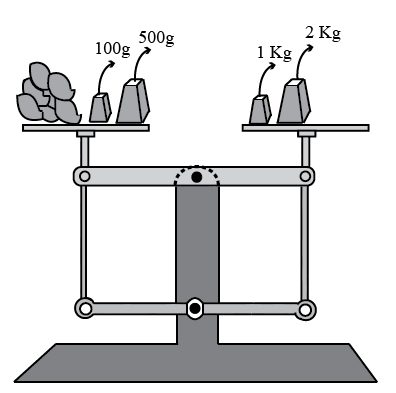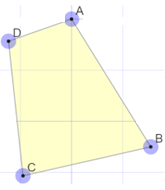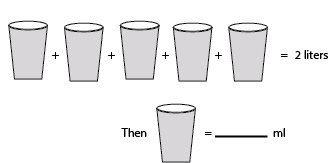4th Grade > Mathematics
MEASUREMENTS MCQs
Total Questions : 40
| Page 2 of 4 pages
Answer: Option B. -> Balance scale
:
B
Measuring tape is used to measure length. For example, the length of a cloth. Compass shows direction. Measuring Can is used to measure the volume of a liquid.
The balance scale is the instrumentused for weighing an object.
:
B
Measuring tape is used to measure length. For example, the length of a cloth. Compass shows direction. Measuring Can is used to measure the volume of a liquid.
The balance scale is the instrumentused for weighing an object.
Answer: Option C. -> 1000
:
C
The conversion factor for kilometre to metre is 1000.
When we convert a bigger unit (km) to a smaller unit (m), we multiply.
Therefore, 1 km = 1×1000 = 1000 m
:
C
The conversion factor for kilometre to metre is 1000.
When we convert a bigger unit (km) to a smaller unit (m), we multiply.
Therefore, 1 km = 1×1000 = 1000 m
Answer: Option B. -> 20.3 km
:
B
We need to convert 300 m to km. To convert a smaller unit (m)to a bigger unit (km), we need to divide by the conversion factor.
We know that 1000 m = 1 km
∴ 300 m = 3001000= 0.300 km.
Hence, 20 km + 0.300 km = 20.300 km = 20.3 km
:
B
We need to convert 300 m to km. To convert a smaller unit (m)to a bigger unit (km), we need to divide by the conversion factor.
We know that 1000 m = 1 km
∴ 300 m = 3001000= 0.300 km.
Hence, 20 km + 0.300 km = 20.300 km = 20.3 km
Answer: Option C. -> 3600 g
:
C
Both the quantities 4 kg and 400 g have different units.
So let's convert 4 kg to grams.
We know that 1 kg = 1000 g
(To convert a larger unit (kg) to a smaller unit (g) we multiply by the conversion factor.)
Therefore, 4 kg = 4 ×1000 g
Now, 4000 g - 400 g = 3600 g
:
C
Both the quantities 4 kg and 400 g have different units.
So let's convert 4 kg to grams.
We know that 1 kg = 1000 g
(To convert a larger unit (kg) to a smaller unit (g) we multiply by the conversion factor.)
Therefore, 4 kg = 4 ×1000 g
Now, 4000 g - 400 g = 3600 g
Answer: Option B. -> 2.4 kg
:
B
Weight of mangoes + 100 g+ 500 g=1 kg + 2 kg
⇒Required weight+ 600 g=3 kg
⇒Required weight=3 kg - 600 g
To move ahead, we need to convert the units. Since we need the final answer in kilograms, let us convert 600 g to kilograms.
1kg=1000g
⇒600 g=6001000kg
=0.6kg
∴Weight of mangoes=3 kg - 0.6 kg
=2.4 kg
:
B
Weight of mangoes + 100 g+ 500 g=1 kg + 2 kg
⇒Required weight+ 600 g=3 kg
⇒Required weight=3 kg - 600 g
To move ahead, we need to convert the units. Since we need the final answer in kilograms, let us convert 600 g to kilograms.
1kg=1000g
⇒600 g=6001000kg
=0.6kg
∴Weight of mangoes=3 kg - 0.6 kg
=2.4 kg
Answer: Option C. -> 1 m = 100 cm
:
C
We know that,
1 m = 100 cm
1 km = 1000 m
1 cm = 10 mm
∴ Inthe 4 given options,1 m = 100 cm is correct.
:
C
We know that,
1 m = 100 cm
1 km = 1000 m
1 cm = 10 mm
∴ Inthe 4 given options,1 m = 100 cm is correct.
Answer: Option B. -> multiply by 100
:
B
When we convert a larger unit (m) to a smaller unit (cm), we multiplyby the conversion factor.
Therefore, to convert length given in metres (m) to centimetres (cm) we have to multiply by 100.
:
B
When we convert a larger unit (m) to a smaller unit (cm), we multiplyby the conversion factor.
Therefore, to convert length given in metres (m) to centimetres (cm) we have to multiply by 100.
Answer: Option A. -> 2200 mL
:
A
1L=1000mL
⇒6L=6×1000mL=6000mL
Thus, the total quantity of lemonade to be prepared is 6000 mL. The quantity of lime juice that we have is 3800 mL.
⇒ Quantity of water required to make the lemonade is given by
6000 mL- 3800 mL = 2200 mL.
:
A
1L=1000mL
⇒6L=6×1000mL=6000mL
Thus, the total quantity of lemonade to be prepared is 6000 mL. The quantity of lime juice that we have is 3800 mL.
⇒ Quantity of water required to make the lemonade is given by
6000 mL- 3800 mL = 2200 mL.
Answer: Option A. -> 10 mm
:
A
String `A` is starting from 1 cm.
∴ Subtract 1 cm from 9 cm.
Lenght of string A
=9cm−1cm=8cm
String `B` is starting from 3 cm.
∴ Subtract 3 cm from 10 cm.
Length of string B
=10cm−3cm=7cm
Thus, the difference in length of String `A` and String `B`
=8cm−7cm=1cm=10mm
∴ Thelength of string A is morethan string B by 10 mm.
:
A
String `A` is starting from 1 cm.
∴ Subtract 1 cm from 9 cm.
Lenght of string A
=9cm−1cm=8cm
String `B` is starting from 3 cm.
∴ Subtract 3 cm from 10 cm.
Length of string B
=10cm−3cm=7cm
Thus, the difference in length of String `A` and String `B`
=8cm−7cm=1cm=10mm
∴ Thelength of string A is morethan string B by 10 mm.
Answer: Option D. -> 400 mL
:
D
Capacity of 5 glasses = 2 Litres
When we convert a larger unit (L) to a smaller unit (mL) we multiply.
1 Litre = 1000 mL
Hence 2 Litres = 2 × 1000 = 2000 mL
Capacity of 1 glass = Total capacity÷ No. of glasses
Capacity of 1 glass = 2000 ÷ 5
=400 mL
:
D
Capacity of 5 glasses = 2 Litres
When we convert a larger unit (L) to a smaller unit (mL) we multiply.
1 Litre = 1000 mL
Hence 2 Litres = 2 × 1000 = 2000 mL
Capacity of 1 glass = Total capacity÷ No. of glasses
Capacity of 1 glass = 2000 ÷ 5
=400 mL



















